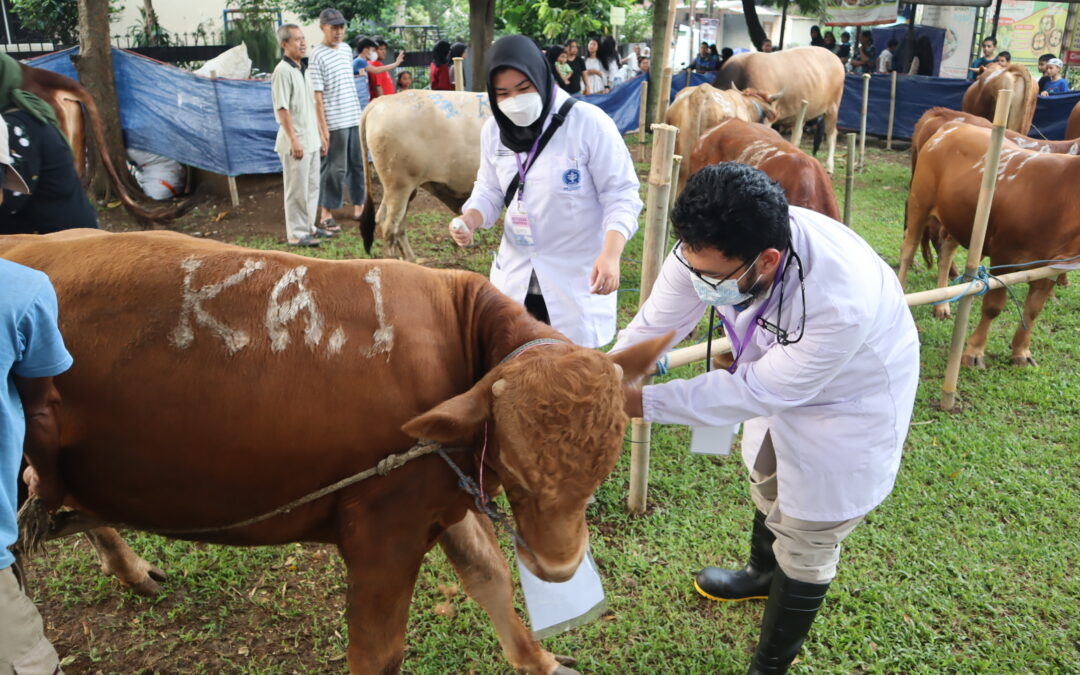The School of Veterinary Medicine and Biomedical Sciences (SVMBS) IPB University deployed animal health and meat inspection officers for Eid al-Adha 1445H. A total of 375 multi-level students (undergraduate, veterinary profession, and graduate students) and 63 faculty members participated in this event, covering the areas of Bogor City and Regency, Depok City, and DKI Jakarta (West, East, Central, and South Jakarta). This activity is a collaboration between SVMBS IPB University and the Bogor City Food and Agriculture Security Service, Bogor Regency Fisheries and Livestock Service, Depok City Food, Agriculture, and Fisheries Security Service, and DKI Jakarta Food, Maritime, and Agriculture Security Service.
In the Bogor City and Regency and Depok City areas, the ante-mortem inspection began on Sunday (June 16, 2024) to ensure the health of the animals to be slaughtered. The post-mortem inspection followed on Monday (June 17, 2024), on the day of Eid al-Adha, to ensure that all parts of the slaughtered animals distributed to the public are safe and healthy for consumption.
Dr. drh. Herwin Pisestyani, M.Si., the Head of the Animal Health and Meat Inspection Committee at SVMBS IPB, emphasized, “The ante-mortem inspection is conducted to ensure that the animals to be slaughtered are in good health. All physical examinations of the animals are performed, including checking if they meet the age requirements for sacrifice. In addition, post-mortem inspections must be carried out to confirm health status based on internal organ examinations.”
According to reports from the field officers, although the percentage is small, some sacrificial animals were found to be ‘defective’, such as having only one descended testicle and not being in good health. Additionally, some animals, despite appearing healthy, did not meet the age requirements according to Islamic law. This serves as a reminder for the public to obtain sacrificial animals with an animal health certificate from the official veterinarian and ensure they meet the requirements for sacrificial animals before purchasing them.
This activity, consistently conducted by SVMBS IPB University for decades, has contributed to raising awareness among the public and animal slaughter managers regarding the handling of animals and their meat products. The Dean of SVMBS IPB University, drh. Amrozi, Ph.D noted that many managers have carried out proper slaughter practices, from the animal’s downfall process, handling of blood and offal waste, to the handling of the animal post-slaughter and the distribution of meat to the public.
“Many mosque committees have now invested in equipment and infrastructure for sacrificial activities, from the pre-slaughter stage to the distribution of the meat. This indicates an increased public awareness of good practices in providing animal-derived food, which is not only halal but also safe,” he concluded.
This animal health and meat inspection activity is a form of community service carried out by SVMBS IPB University. It is also part of the veterinary profession’s responsibility to ensure the quality of animal-derived food and public health as consumers of animal-derived food. (DDC)
Sources: Dr. drh. Herwin Pisestyani, M.Si
Photo Description: Scene of animal and meat inspection.
Photo by: Dinneke Octaviana Aluwih
SDGs: SDG 2, SDG 3, SDG 4
SDG Keywords: animal health, food safety, education and training, public health
Additional SEO Keywords: sacrificial animal inspection, sacrificial animals, community service, veterinary health services, antemortem inspection, postmortem inspection, IPB University, SDGs

